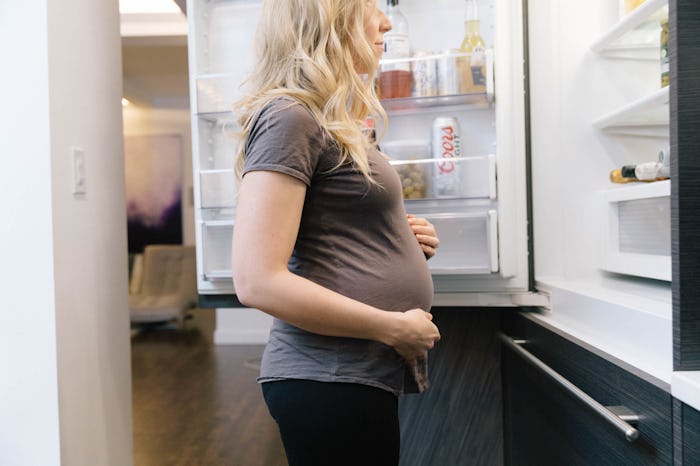Life
Here's What You Really Need To Know About Contracting Listeria During Pregnancy
When you first get pregnant, at least for me, in addition to everyone asking me what I was having, I got a ton of unsolicited advice about what I was allowed to eat. “No raw eggs, deli meat, or soft cheese now,” everyone would smugly remind me. “You don’t want to get listeria.” But just how common is listeria during pregnancy? Is it OK to splurge and have a little taste of that unpasteurized brie? What are the chances that I’ll actually contract listeria?
Thankfully, listeria isn’t that common during pregnancy, according to Dr. Jamil Abdur-Rahman, an OB-GYN and medical travel blogger along with his twin brother for TwinDoctorsTV. He says in an email interview with Romper that according to the Centers for Disease Control and Prevention (CDC), there are only 1600 cases of listeria documented in the U.S. annually. “Of these 1600 cases, roughly one in every seven of them are seen in pregnant women. This means that we see about 200 to 300 cases of listeria in pregnant women annually. While this number isn't that impressive on its face, consider the fact that one in seven (i.e., 14 percent) of Americans are not pregnant,” he explains. “So if only two percent of Americans are pregnant at any one time, but 14 percent of listeria infections are seen in pregnant people, then the infection is dramatically overrepresented in pregnant women.”
Why are pregnant women more susceptible to listeria, even though it’s uncommon to contract? Abdur-Rahman says that pregnant women are seven times more likely to contract listeria because their immune systems aren’t as active as non-pregnant people’s immune systems. “The reason for this is that a growing fetus is a ‘foreign invader’ as far as a pregnant woman's immune system is concerned. After all, that growing fetus' genetic material is half familiar to mom's immune system, but the other half is not. So, if a pregnant woman's immune system were not somewhat compromised, it would attack the ‘foreign invader’ growing within its womb,” Abdur-Rahman explains. Since the immune system is “tamped down,” it’s good for your little “foreign invader,” but “bad for fighting off infection.”
Abdur-Rahman says to stay away from unpasteurized dairy products, unwashed fruits and veggies, and lunch meats in order to be less likely to contract listeria. Thankfully, in the U.S., most of our food standards and food safety laws are pretty good at preventing listeria, but it never hurts to use caution. “When food that contains listeria has been ingested, the bacteria can then enter a person's bloodstream. Once in the blood stream, the bacteria can travel to the placenta, cross the placenta, and then infect a growing baby,” Abdur-Rahman says. And while typically, pregnant women don’t die from listeria — though it can cause preterm labor — there’s a 20 percent chance that it could be fatal for your baby. “The listeria bacteria has an affinity for the nervous system, so, when a developing fetus' brain is attacked by the bacteria, death frequently results,” he explains.
Symptoms of listeria are pretty “non-specific” for people who aren’t pregnant, and it will be just like general flu symptoms, Abdur-Rahman says. However, for pregnant people, they have more pronounced symptoms, such as “persistent headaches, a stiff neck, and even seizures or a loss of consciousness.” It is typically treated by oral antibiotics, pregnant or not. So at least treating listeria is a pretty simple procedure.
While pretty uncommon — especially in the U.S. — taking precautions against ingesting food that could potentially have listeria is a good idea while you’re pregnant, and again, that includes unpasteurized cheeses, unwashed fruits and veggies, and deli meats. As always, consult your doctor if you have any questions about what you should and should not eat while you’re pregnant. I know you miss brie and turkey sandwiches (or maybe that’s just me), but your time to eat those delicious foods will be back soon enough.
Check out Romper's new video series, Bearing The Motherload, where disagreeing parents from different sides of an issue sit down with a mediator and talk about how to support (and not judge) each other’s parenting perspectives. New episodes air Mondays on Facebook.
